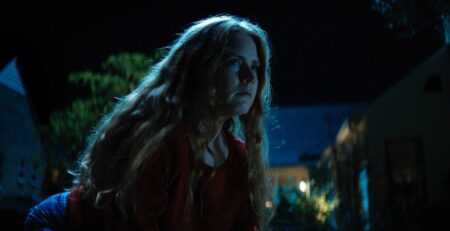
Josée, the 2020 South Korean drama film made its North American premiere at Fantasia Fest 2021. The latest in a line of adaptation since the source material was published in 1984, Josee is directed by Kim Jong-kwan and stars Hwang Do-Yun, Han Ji-min, and Nam Joo-Hyuk. The film is based on a short story by Japanese author Seiko Tanabe and comes after the release of Josee, The Tiger and the Fish in North America. But to start this review, though both films are based on the same material, they are vastly different.
While walking, Young-seok (Nam Joo-hyuk), a lonely student with a rocky love life rescues Josée (Han Ji-min) after an incident that leaves her electric wheelchair disabled. He takes her home to discover that it’s in a fairly shocking state of dilapidation, with only an old woman she calls grandma living with her. Relying on selling recyclables that she collects, it’s clear that both the women need a helping hand. But what starts as Young-seok wanting to help the pair develops into a romance as Josée begins to reveal her life to him. She cooks for him, invites him into parts of her past, and their companionship begins to blossom. In a sweet and somber love story, Young-seok begins to recognize that Josée’s memories are more fantasy, driven by her love of the books which is her only reprieve.
Josee, The Tiger and the Fish is one of my favorite films this year. So, when I saw this film on Fantasia Fest’s programming, I was intrigued. While many films that use the same source material tend to draw comparisons between each other, this latest live-action is a more intimate story driven by faithfulness to the source material. Truth be told, it’s hard to even put the two adaptations I’ve seen this year in the same category. So, leave any expectations at the door—and that’s a good thing.
Josée is a film about closeness and growing. It’s about the way we survive and how we retreat into moments that bring us solace, and sometimes, we need to be pulled out of them. Young-seok’s kindness and love work as a bridge forJosée to see herself beyond the character in her favorite books. She begins to see the world as a place to be a part of instead to remain hidden from. But on his part, Young-seok isn’t the most well-adjusted person either. When it comes to romance, it’s safe to say he doesn’t make meaningful connections. So while we watch our titular character grow, she isn’t someone who needs to be saved by an able-bodied love interest. Both characters grow and learn about themselves and while those moments seem tinged with an element of sadness they are moments of intimacy that are both acted and written extremely well.
That said, Josée finds its strength with its titular character. Her awkwardness, her stubbornness, her vulnerability, and ultimately her strength. She is a whole person, not just someone who needs to be saved by someone else. Whether it’s in her home where she moves with agency and how she chooses, regardless of what Young-seok tells her or embracing her sexuality, she is in control. On top of that, the way her trauma informs her actions. Her dark humor, her awkward interjections; it all makes her complex. Most importantly, however, is that she isn’t defined by her romance, but rather, she aims to be in a space where she can survive without it. Love can trap us, and we can trap other people. Josée is about how love heals, and also how sometimes, we need to let it go.
Overall, Josée is a stunningly shot film with a heaviness that carries through the film’s blue tones and score. In a mix of somber and sweet watching the intimacy build and unravel over time is captivating. Nam Joo-hyuk and Han Ji-min carry the film and its weight wonderfully and with a steadfast vulnerability that reaches through the screen.
Josée is screening at the Fantasia International Film Festival 2021.
Josée
-
Rating - 8.5/108.5/10
TL;DR
Overall, Josée is a stunningly shot film with a heaviness that carries through the film’s blue tones and score. In a mix of somber and sweet watching the intimacy build and unravel over time is captivating. Hwang Do-Yun and Han Ji-min carry the film and its weight wonderfully and with a steadfast vulnerability that reaches through the screen.




